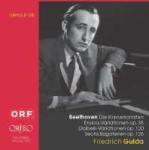I believe these Austrian radio Beethoven broadcast recordings with Friedrich Gulda (1953/54 for the sonatas, 1957 for the variation sets and Op. 126 Bagatelles) attain their first official release here. Stylistically speaking, they are closer to Gulda’s early-to-late-1950s studio cycle for Decca than to his late-1960s Amadeo remakes.
Faster movements generally mirror Schnabel’s headlong brio, but with greater technical accuracy, while the brisk slow movements are slightly more flexible in relation to Gulda’s relatively militant Amadeo counterparts. However, Austrian radio’s apparent live-to-air, unedited environment seems to elicit more animation and nuance all around. This especially comes across in the Moonlight’s hypnotically drawn-out Adagio sostenuto, the Op. 10 sonatas, and the late works from Op. 90 onward.
Compare, for example, Decca’s careful, slightly stodgy Op. 109 second movement to Orfeo’s stronger propulsion and more scrupulous adherence to Beethoven’s articulation directives. Similar observations apply to Orfeo’s lighter, more specifically characterized Tempest sonata finale. If this Op. 54 doesn’t swing so freely as Gulda’s Amadeo version, at least the younger Gulda doesn’t plow through the Waldstein’s transition into the Rondo, although the latter’s basic fast tempo and general avoidance of Beethoven’s long pedal markings are open to question. On Decca, both Op. 14 finales are clean but a shade square; here they’re playful and angular.
To be sure, Decca edges out Orfeo in a few cases; note the pianist’s superior voice-leading in his more sharply etched Decca Op. 26 and Op. 28 Scherzos. But Gulda’s assured virtuosity and joyful abandon pay expressive dividends in the Eroica and Diabelli Variation sets not apparent in the pianist’s commercial versions. Gulda’s youthful maturity also manifests itself throughout the Op. 126 Bagatelles, although his overly moderate, somewhat pedantic treatment of No. 4 falls flat.
I can’t agree with Gulda’s disparagement of these recordings; they add up to a persuasive document of the 20-something pianist’s headstrong powers in this repertoire and stand as one of the most invigorating and agreeably engineered Beethoven cycles of its time. [7/16/2010]
































